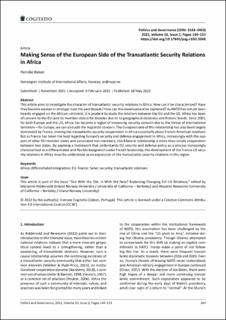| dc.contributor.author | Rieker, Pernille | |
| dc.date.accessioned | 2022-08-02T11:12:34Z | |
| dc.date.available | 2022-08-02T11:12:34Z | |
| dc.date.created | 2022-05-27T12:32:50Z | |
| dc.date.issued | 2022 | |
| dc.identifier.citation | Politics and Governance. 2022, 20 (2), 144-153. | en_US |
| dc.identifier.issn | 2183-2463 | |
| dc.identifier.uri | https://hdl.handle.net/11250/3009778 | |
| dc.description.abstract | This article aims to investigate the character of transatlantic security relations in Africa: How can it be characterized? Have they become weaker or stronger over the past decade? How can this development be explained? As NATO has not yet been heavily engaged on the African continent, it is prudent to study the relations between the EU and the US. Africa has been of concern to the EU (and its member states) for decades due to its geographical closeness and historic bonds. Since 2001, for both Europe and the US, Africa has become a region of increasing security concern due to the threat of international terrorism—for Europe, we can also add the migration concern. The European side of this relationship has also been largely dominated by France, making the transatlantic security cooperation in Africa essentially about French-American relations. As France has taken the lead regarding Europe’s security and defense engagement in Africa, increasingly with the support of other EU member states and associated non-members, this bilateral relationship is more than simply cooperation between two states. By applying a framework that understands EU security and defense policy as a process increasingly characterized as a differentiated and flexible integration under French leadership, the development of the Franco-US security relations in Africa must be understood as an expression of the transatlantic security relations in this region. | en_US |
| dc.description.abstract | Making Sense of the European Side of the Transatlantic Security Relations in Africa | en_US |
| dc.language.iso | eng | en_US |
| dc.rights | Navngivelse 4.0 Internasjonal | * |
| dc.rights.uri | http://creativecommons.org/licenses/by/4.0/deed.no | * |
| dc.subject | The Middle East and North Africa | en_US |
| dc.subject | Security policies | en_US |
| dc.subject | NATO | en_US |
| dc.subject | Africa | en_US |
| dc.subject | Sahel | en_US |
| dc.subject | EU | en_US |
| dc.subject | France | en_US |
| dc.title | Making Sense of the European Side of the Transatlantic Security Relations in Africa | en_US |
| dc.title.alternative | Making Sense of the European Side of the Transatlantic Security Relations in Africa | en_US |
| dc.type | Peer reviewed | en_US |
| dc.type | Journal article | en_US |
| dc.description.version | publishedVersion | en_US |
| dc.subject.nsi | VDP::Internasjonal politikk: 243 | en_US |
| dc.subject.nsi | VDP::International politics: 243 | en_US |
| dc.source.pagenumber | 144-153 | en_US |
| dc.source.volume | 20 | en_US |
| dc.source.journal | Politics and Governance | en_US |
| dc.source.issue | 2 | en_US |
| dc.identifier.doi | 10.17645/pag.v10i2.5048 | |
| dc.identifier.cristin | 2027690 | |
| cristin.ispublished | true | |
| cristin.fulltext | original | |
| cristin.qualitycode | 1 | |

